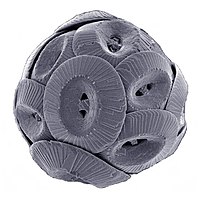
Photo from wikipedia
Seawater acidification can cause threats to both calcifying and uncalcifying marine organisms, affecting their acid-base regulatory functions like immune system and biomineralization. Marine pollutants, such as cadmium (Cd) that is… Click to show full abstract
Seawater acidification can cause threats to both calcifying and uncalcifying marine organisms, affecting their acid-base regulatory functions like immune system and biomineralization. Marine pollutants, such as cadmium (Cd) that is globally distributed in coastal ecosystems, do not affect organisms alone but commonly as combined stressors. To investigate the toxicological effects of Cd on the immune and biomineralization of marine fishes under seawater acidification, flounder Paralichthys olivaceus was exposed to seawater acidification (control (pH 8.10), 7.70 and 7.30) and Cd exposure (control (0.36 μg L-1), 0.01 and 0.15 mg L-1 Cd) for 49 days from embryonic stage until they became settled. Immune and biomineralization-related biomarkers of flounder at the end of exposure were investigated. Results showed that single seawater acidification and Cd exposure or combined exposure significantly affected the immune system-related enzyme activities. Specifically, lysozyme (LZM) activity was significantly inhibited by single seawater acidification and Cd exposure, indicating innate immunosuppression under two stressors. Contents of IgM, HSP70 and MT were induced by seawater acidification or Cd exposure, indicating a detoxification mechanism that responded to the stressors. The expressions of immune-related genes were upregulated (hsp70 and mt) or downregulated (lzm) under Cd exposure. Of the biomineralization-related enzymes, activities of carbonic anhydrase (CA), Na+/K+-ATPase and Ca2+-ATPase increased under seawater acidification and Cd exposure, a potential mechanism in response to changes of acid-base balance induced by the stressors. Generally, immune and biomineralization of the flounder responded more sensitively to Cd exposure than seawater acidification. Seawater acidification aggravated the toxicological effects of Cd exposure on the two physiological functions, while high Cd exposure augmented their responses to seawater acidification.
Journal Title: Chemosphere
Year Published: 2021
Link to full text (if available)
Share on Social Media: Sign Up to like & get
recommendations!